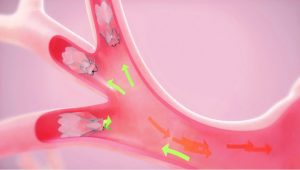UConn John Dempsey Hospital is first in Connecticut to offer severe emphysema patients an innovative, minimally invasive valve implant to help them breathe easier.
On August 10 UConn Health’s Dr. Omar Ibrahim, director of interventional pulmonary medicine in the Department of Medicine, performed the state’s first procedure using the FDA-approved Zephyr Valve.
The tiny valve devices allow severe emphysema patients to breathe better, be more active and have improved quality of life by improving their lung function. According to Ibrahim the technology will also help his patients improve their results of pulmonary lung function tests, decrease their shortness of breath, and reduce their daily reliance on supplemental oxygen.
“This procedure is giving severe emphysema patients a new lease on life by making it easier for them to breathe again by blocking off the most diseased section of their lung and allowing the healthy parts of the lung to function better,” says Ibrahim. “This technology is going to help improve not only my emphysema patients’ breathing but their quality of life by lifting the current restrictions on their daily activities. They will now be able to enjoy life again, play with their grandkids, and go on walks.”
Ibrahim adds: “This technology is a true game-changer for patients with severe emphysema. It’s a new solution we can offer the citizens of our state living each day with very difficult and debilitating emphysema. The disease has not had a significant treatment breakthrough in a very long time.”
Emphysema is the severest form of chronic obstructive pulmonary disease (COPD). The disease causes patients to feel short of breath, and breathless or unable to take a deep breath at times. It is most often caused by smoking or a history of smoking, but it also can be caused by a genetic condition.
Patients with emphysema can experience a hyperinflation of their lungs. This is air trapped inside lung lobes with no way for the air to escape causing the lungs to become enlarged. As a result, a patient’s chest is over expanded causing an imbalance in inhalation and exhalation of air. The condition can be life-threatening.

The tiny Zephyr Valves are minimally invasively implanted into a patient’s lung lobes airways using a bronchoscope with a flexible catheter; no cutting or incision is required. The device is deployed to block the airways to allow air to flow out of the lung lobes but not back in so the lobes have a chance to properly deflate and begin to function normally allowing the patient to more easily breathe in and out. Each patient receives about four valves on average during a procedure.
“Severe emphysema patients and pulmonary doctors from across the state now have a trusted place here at UConn Health to turn to for this new minimally invasive solution, with proper protocols and facilities,” says Ibrahim. “We are already partnering with other local hospitals and other facilities to help get patients the latest available care option they may need.”
Candidates for the new valve procedure are patients with severe emphysema who have exhausted all other traditional medical therapies. This patient population is high-risk for having a traditional lung volume reduction surgery option due to risk of complications and morbidity.



